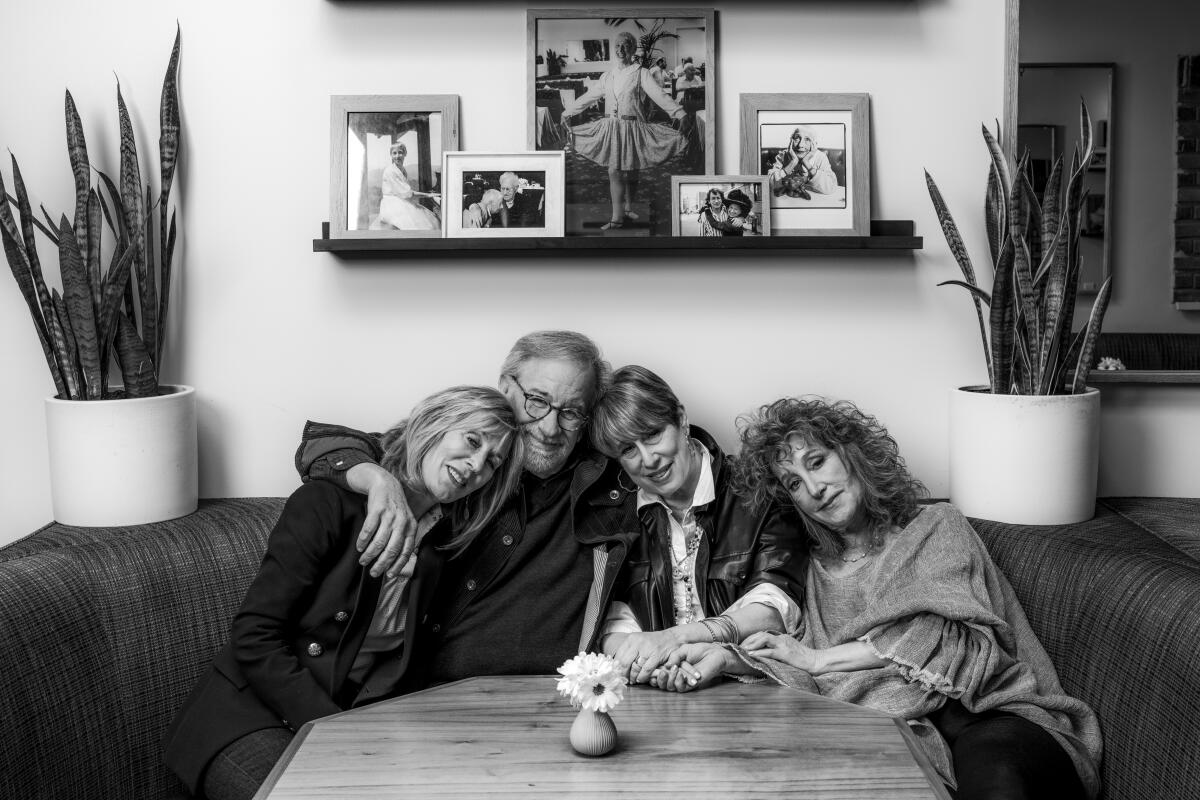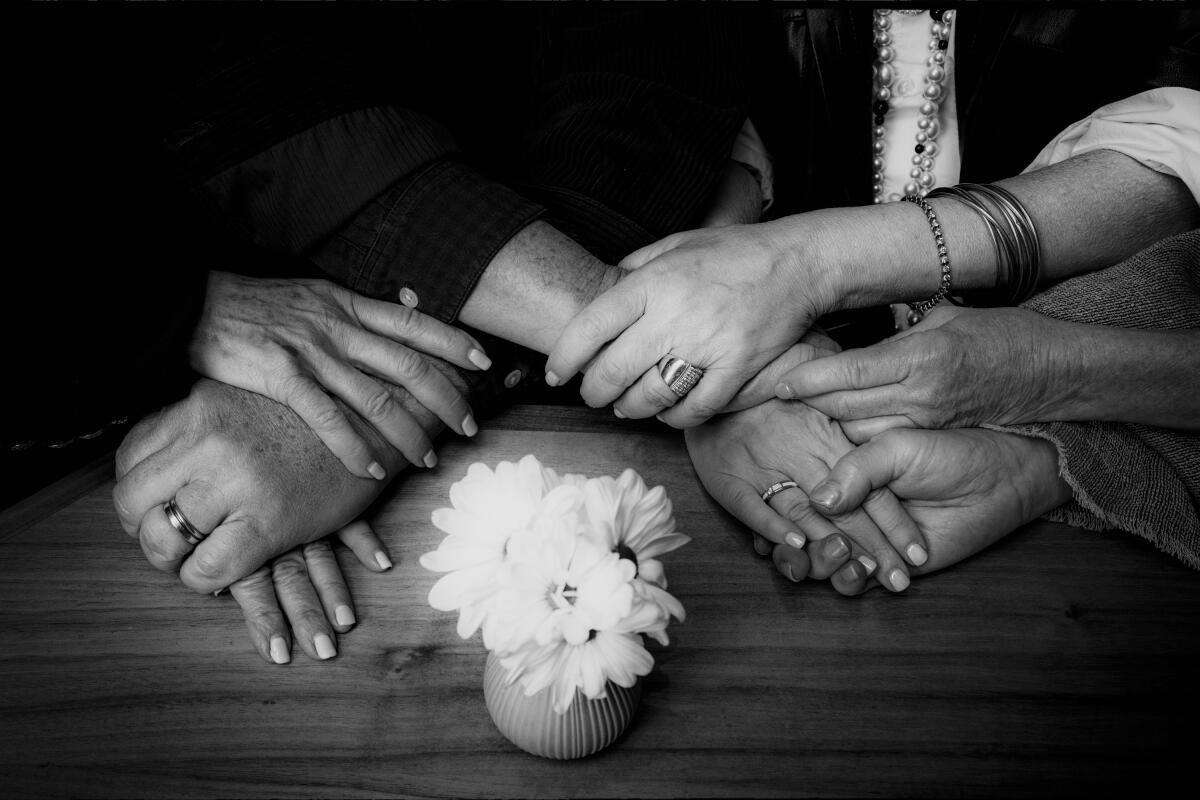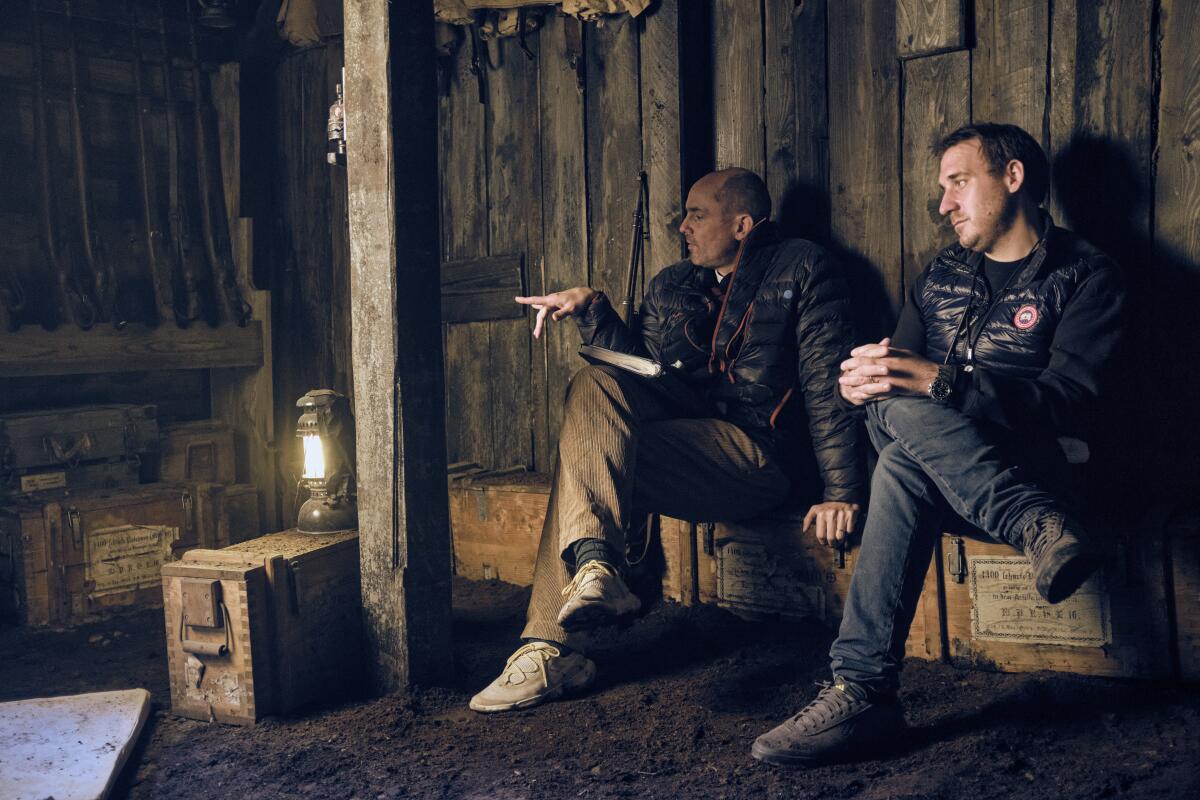Crying and laughing with the Spielbergs

Have you ever fallen in love with someone right at the exact same time they’re falling in love with you? (I’m talking about humans here, not a dog. Because I fall in love with dogs — and they fall in love with me, because that’s what they do — on an almost daily basis.) It is, so I understand, like snow on the beach, a rare occurrence ... unless you happen to be in California this week. Then, it’s comin’ down ... it’s comin’ down ...
From the Oscars to the Emmys.
Get the Envelope newsletter for exclusive awards season coverage, behind-the-scenes stories from the Envelope podcast and columnist Glenn Whipp’s must-read analysis.
You may occasionally receive promotional content from the Los Angeles Times.
I’m Glenn Whipp, columnist for the Los Angeles Times, host of The Envelope’s Friday newsletter and the guy who may well be trying all 19 of these cafes that make L.A. a world-class coffee destination this weekend because A) I need the caffeine and B) it’s freakin’ cold outside!
Laughter and tears with the Spielbergs
Steven Spielberg and his sisters — Anne, Sue and Nancy — are singing along to “My Girl.” And not just singing, mind you. They have the choreography pretty much down pat, their arms and feet moving to the Temptations’ classic Motown beat, and they’re taking such delight in harmonizing that it seems clear this must be their favorite family song ... until the next number on the playlist starts and the opening drumbeat to the Ronettes’ classic “Be My Baby” rings out and within a few seconds the siblings are singing the “whoa-oh-oh-oh” chorus at the top of their lungs.
We’re crowded in a booth inside the Milky Way, the West Los Angeles restaurant that the Spielbergs’ mother, Leah Adler, opened in 1977 with her second husband, Bernie, an eatery the family still owns and operates. “Mom was part of that harmony until she was 96 years old,” Steven tells me, just before pleading with his sisters to break out some of the melodies they used to sing together on Rosh Hashanah and Yom Kippur. They oblige. He is the big brother, after all. “I’d be in big trouble if I had been born last,” Steven says. The women do not dispute this.
The Spielbergs haven’t seen each other since the AFI Fest premiere of “The Fabelmans,” Steven’s tender recounting of his filmmaking origin story folded inside an empathetic look at a complex relationship between his decent father and unfulfilled-artist mother. Steven thought the event was three weeks ago. Anne, the oldest sister, sets him straight: “No, that was November, Steve” — the sisters still call him Steve, as they always have — “and it’s February now.”
We settled in for a long conversation about family, forgiveness and how “The Fabelmans” brought the siblings closer. It might not surprise you to learn that about 20 minutes into our conversation, a family friend walked over to the table and quietly placed a tissue box in its center. Laughter and tears. That’s the story of just about every family, and the Spielbergs are no exception. “Who else knows your whole being and doesn’t judge you for it?” Sue says, to which her brother adds: “And calls bull— on you.”

Pathways to the best picture Oscar
In olden times, part of the fun in watching the Oscars via this medium we used to call “TV” was parsing the early awards given during the show and imagining how they were creating a narrative and, perhaps, forecasting which movie would win the ceremony’s last prize.
Nowadays, it’s a battle just to get all the awards to be presented on air, and many viewers pay closer attention to the body language and forced smiles of the attendees than to the awards themselves. If it was guaranteed that Jennifer Lopez and Ben Affleck would reprise their Grammys audience act at the Oscars, ratings would skyrocket. Could the film academy brass make this happen by offering them a lifetime supply of Dunkin’ donuts? Perhaps ... though let’s be real: J. Lo probably hasn’t eaten an apple fritter in decades. (Hey ... more for Ben!)
But the Oscar clues are still there for those who care enough to pay attention. What prizes do the leading best picture contenders need to take to score that top award? Grab a cruller and let’s take a look!

Enjoying this newsletter? Consider subscribing to the Los Angeles Times
Your support helps us deliver the news that matters most. Become a subscriber.
How ‘All Quiet on the Western Front’ has changed in 90-plus years
The original “All Quiet on the Western Front,” released in 1930, was the third-ever Oscar best picture winner.
“I love that film,” Edward Berger, who directed the most recent adaptation of Erich Maria Remarque’s 1929 novel, told Times contributor Chris Vognar. “But when I watched it, I realized the screenwriters had read the same scenes and sometimes used the same scenes that I was using in my screenplay. I had to take a breath and put it away and just think about it for a moment and find my own way into it again and just say, ‘No, this is our very subjective interpretation of that story.’”
Chris compared the two versions of the film in a thoughtful essay, examining their styles and tones in the way they approached Remarque’s novel. As the new movie won best picture Sunday at the British Academy Film Awards, Berger’s ideas have clearly resonated with awards season voters. It did earn nine Oscar nominations after all. I can’t see how it can win best picture, but it probably has a better chance than “Tár,” a movie I spotlighted in that column I mentioned in the previous item. So consider this my mea culpa as well as an early congratulatory note on the Oscars it’ll win for international feature and cinematography. (“Tár” is a much better movie though.)

Feedback?
I’d love to hear from you. Email me at [email protected].
Can’t get enough about awards season? Follow me at @glennwhipp on Twitter.
From the Oscars to the Emmys.
Get the Envelope newsletter for exclusive awards season coverage, behind-the-scenes stories from the Envelope podcast and columnist Glenn Whipp’s must-read analysis.
You may occasionally receive promotional content from the Los Angeles Times.




